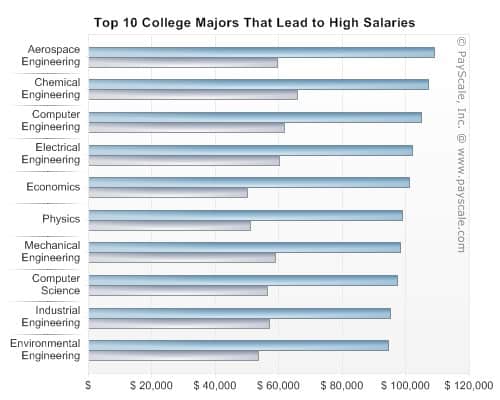
How salaries stack up. Credit: PayScale
By Margaret Harris
Here’s a rare bit of economic good news: people with physics degrees earn more, on average, than their fellow graduates in all but a handful of disciplines.
According to this study by the US website PayScale, physicists are the sixth-highest-earning group of graduates, with a median salary of $98,800 (just under £60k) after at least 10 years in the workforce. Indeed, physics was one of only three non-engineering majors to crack the top ten, along with computer science and economics. Starting salaries for physicists aren’t bad either: $51,100, or a respectable 14th on the same list of 75 different subjects.
In addition to looking at degree subject, the study also ranked 320 US colleges and universities according to their graduates’ salaries. Readers familiar with the US educational system will find some fascinating results in the list for example, graduates of Loma Linda University, a religious college in southern California, have the highest median starting salary, while Dartmouth College grads earn the most at mid-career.
Now for the caveats. PayScale’s data set is based on information provided by users of the website, not a random sample of US graduates. Moreover, the survey didn’t include people with advanced degrees; the researchers wanted to compare salaries for those who earned a bachelor’s degree and no more. So all those physicists working as relatively low-paid teachers (not to mention postdocs) 10 years after graduation weren’t included.
Curious about how these factors might affect the results, I spoke with PayScale’s director of quantitative analysis, Al Lee. Lee is a particle physicist by training, having worked at CERN before moving to Duke University — where, among other things, he taught my first physics course. (It’s a small world sometimes.) Back then, he had a fairly evangelical attitude towards physics, regarding it as great preparation for almost any career, so I was keen to hear his opinion.
Lee explained that while their data set of 1.2 m users “skews white collar”, this has little effect on rankings by major degree subject. “The main bias in the majors data is in the people who choose them,” Lee says. “If you’re a mediocre high school student who goes to a mediocre university, and you major in physics, will you make as much as the people who earn the median? Probably not.” However, such unmotivated students are less likely to choose a physics degree — “it isn’t an accidental major” — so that tends to boosts physics’ median-salary rank.
And of course, medians aren’t the whole story: the difference between mid-career physicists earning in the 90th and 10th percentiles is a massive $108,400. That’s less than degrees like economics ($166,800) but much higher than, say, medical technology ($40k).
As for PayScale’s decision to focus on undergraduate degrees, Lee notes that only 25% of those who earn bachelor’s degrees in the US go on to earn advanced degrees, so the sample size is bigger. It’s also hard to determine which institution or degree — graduate or undergraduate — had the greatest effect on a person’s salary. However, physicists will, on average, receive a salary boost from earning a master’s or PhD. That isn’t the case for those who study English, he says.
So would he still recommend a physics degree? “My kids have to at least minor in physics,” he says, adding that he might bend the rules a little if they wanted to do, say, mathematics or economics instead. “At this point in the history of the US, the ability to do math and think logically is something that pays well.”



